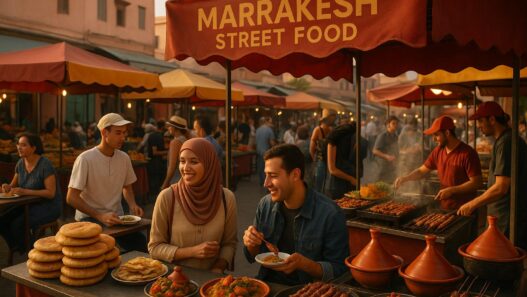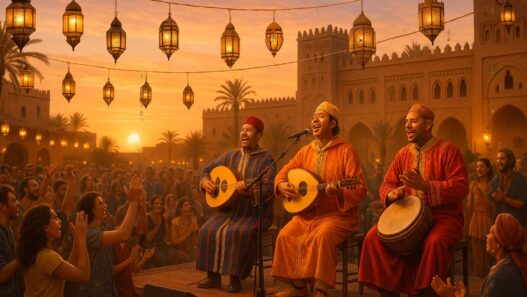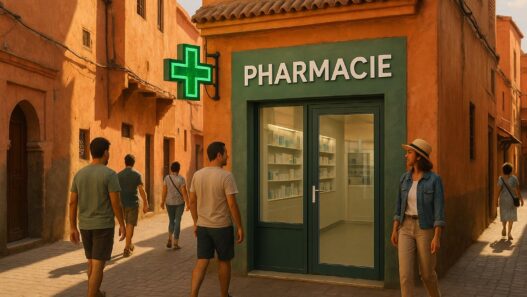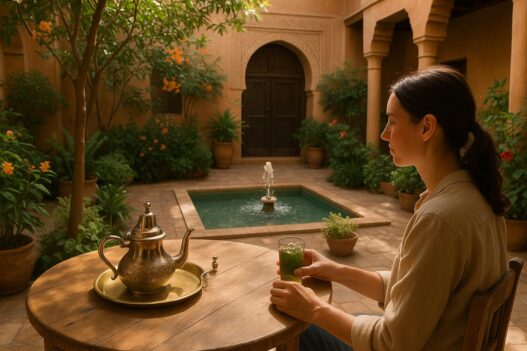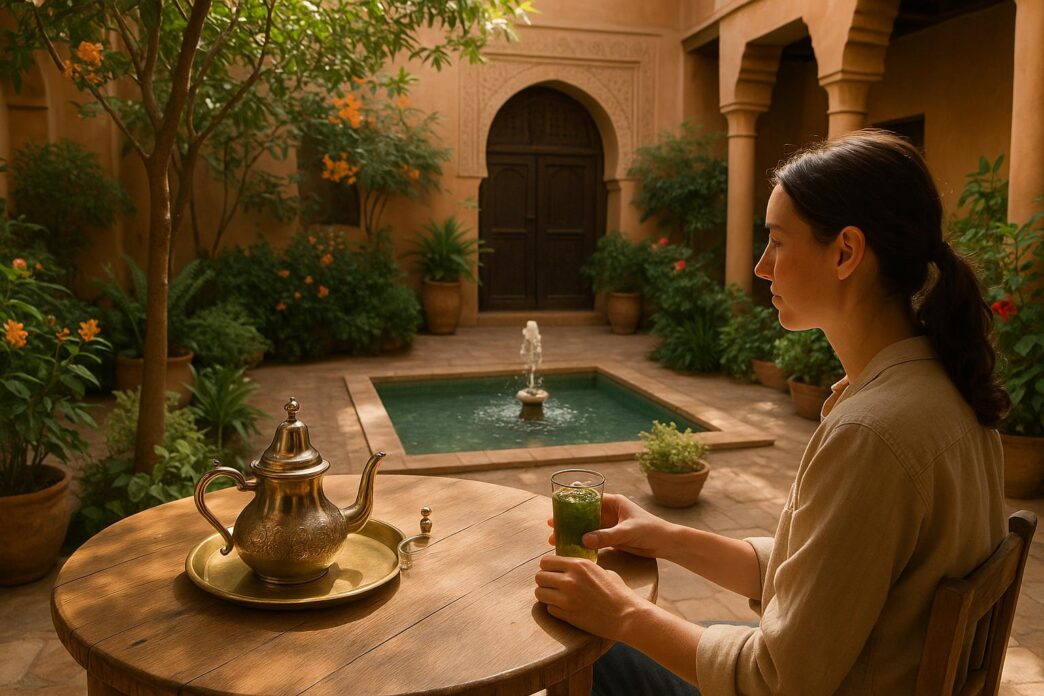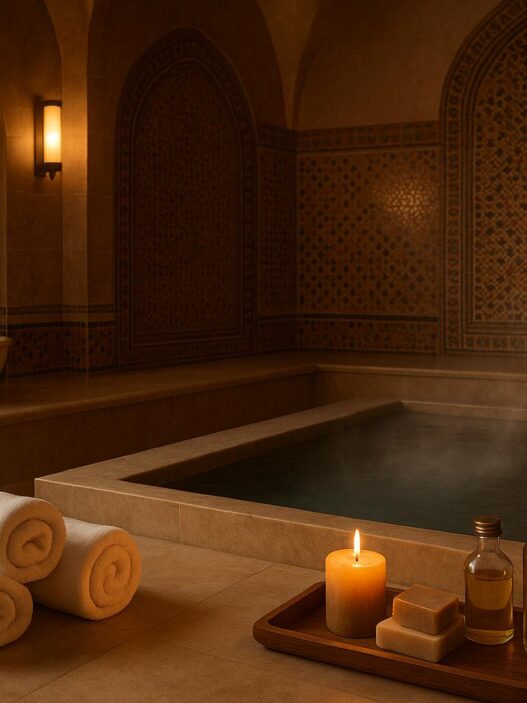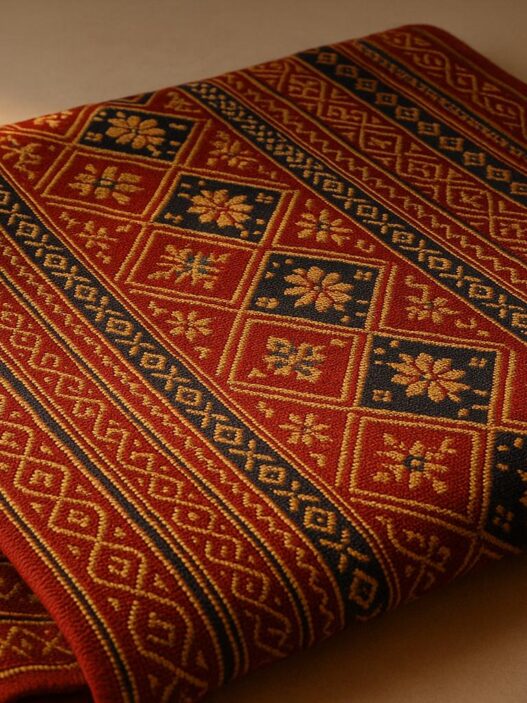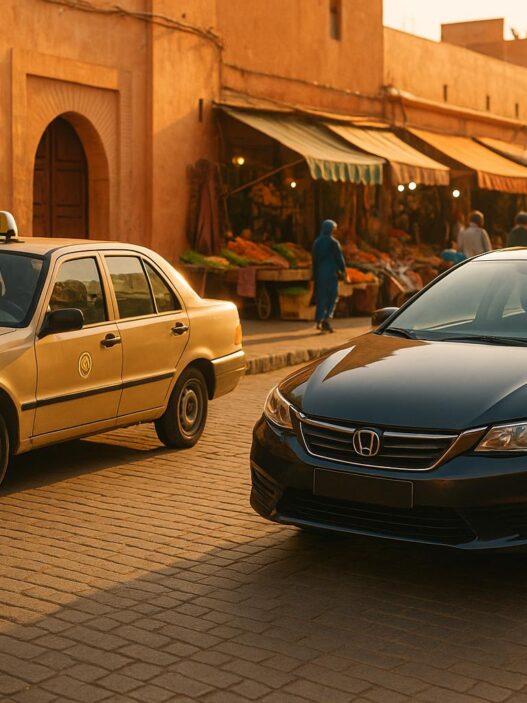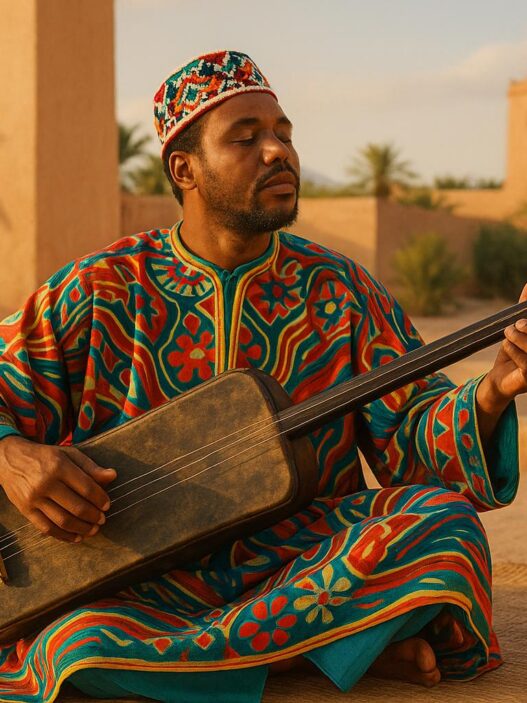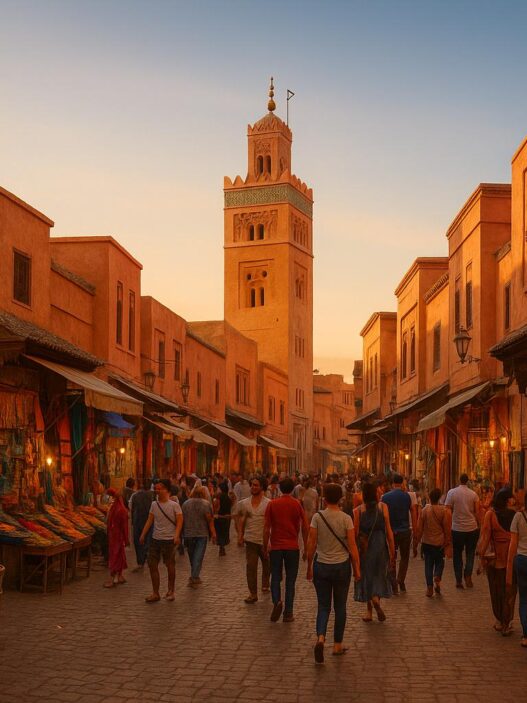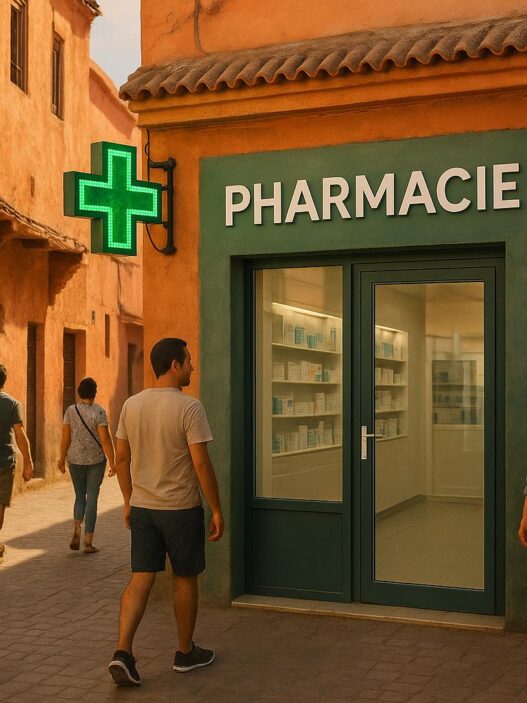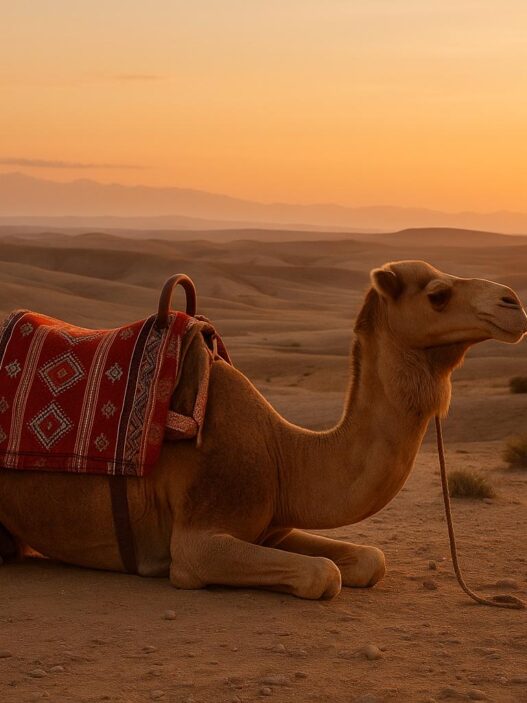Eco-tourism in Marrakesh prioritizes preserving resources while empowering communities. Here’s how you can contribute:
- Stay Green: Choose accommodations with eco-certifications like Green Key. Opt for local guesthouses or riads that prioritize energy efficiency and community support.
- Shop Responsibly: Buy from local artisans or cooperatives like Al Nour or Anou to support craftsmanship and fair trade.
- Eat Local: Dine at restaurants sourcing local ingredients, like Amal, which also supports women’s training programs.
- Eco-Friendly Activities: Join tours or workshops that respect local traditions. Options include artisan workshops or guided eco-tours like those by Kasbah Toubkal.
- Green Transport: Walk, cycle (e.g., Pikala Bikes), or use public transport like electric buses to reduce emissions.
- Give Back: Volunteer or donate to conservation and community projects like Global Family or High Atlas Foundation.
Every choice you make, from where you stay to how you travel, can directly support Marrakesh’s efforts to balance tourism with resource conservation.
Morocco’s ecotourism push | Morocco embraces sustainable tourism | World Of Africa
Choose Eco-Friendly Accommodations
Where you stay in Marrakesh can play a big role in supporting the city’s eco-tourism efforts. The right choice not only helps reduce your environmental impact but also contributes to local conservation and community projects. By selecting accommodations that prioritize sustainability, you can make a meaningful difference.
Look for Green Certifications
When booking a place to stay, give preference to accommodations with green certifications. These certifications indicate that the property has met specific standards for sustainability, such as energy efficiency and waste reduction. Check the hotel’s website for details about their environmental initiatives – things like using renewable energy, minimizing waste, or sourcing food locally. Guest reviews can also provide insight into how well these practices are implemented. For extra assurance, reach out directly to the property and ask about their efforts in areas like water conservation and community engagement. Businesses that are serious about sustainability are usually open and transparent about their practices.
Stay at Locally Owned Guesthouses
Once you’ve identified eco-certified options, consider staying in locally owned guesthouses or riads. These traditional accommodations often blend local heritage with eco-conscious designs, providing an authentic experience while supporting the local economy. Many riads are naturally energy-efficient, thanks to designs that limit the need for air conditioning. Look for properties that actively invest in sustainability by hiring local staff, collaborating with artisans, and funding community projects. For instance, Riad Nelia has adopted water-saving fixtures, energy-efficient LED lighting with motion sensors, and reinvests profits into local initiatives.
Avoid Single-Use Plastics
Seek out accommodations that are actively working to reduce single-use plastics. Many hotels in Marrakesh are finding creative ways to tackle plastic waste. Les Jardins de la Medina, for example, has installed water dispensers to replace single-use plastic bottles, composts organic waste, and even offers bicycles for guests to use. Some properties provide refillable water bottles or filtration systems, while others swap out plastic toiletries for biodegradable or refillable options. Ouirgane Ecolodge sets a strong example by using non-toxic cleaning products and efficient irrigation systems, while Royal Mansour incorporates recycling and composting into its overall waste management plan. When researching hotels, ask about their policies on plastic reduction to ensure your stay aligns with sustainable practices. These small but impactful choices can help make your trip to Marrakesh a more responsible and rewarding experience.
Support Local and Responsible Businesses
The way you shop and dine in Marrakesh doesn’t just affect your experience – it plays a role in supporting the local economy and promoting fair practices. By making thoughtful choices, you can contribute to sustainable tourism while enjoying the richness of the city’s culture.
Shop at Artisanal Markets
Marrakesh’s vibrant souks are a treasure trove of local handicrafts, offering everything from textiles and leather goods to spices and woodwork. By purchasing directly from local vendors, you help ensure that your money stays within the community and supports traditional craftsmanship.
For a more impactful shopping experience, seek out cooperatives, many of which are run by women. For instance, Al Nour provides employment and educational opportunities for local women with disabilities. Here, you can buy handwoven gifts or even take a weaving lesson, making your purchase both meaningful and memorable. Similarly, the Cooperative Aboghlo in Al Haouz province empowers over 30 women by producing goods sold to brands like Yves Saint Laurent.
If you prefer a direct connection with artisans, check out Anou, an online platform that lets you source products directly from craftspeople. You can even schedule visits to meet the artisans in person, adding a personal story to the items you take home.
When shopping, engage with vendors who are welcoming rather than overly aggressive. Bargaining is part of the culture – start by offering about a third of the quoted price and negotiate from there. And if you can’t agree, walking away is perfectly acceptable and often part of the experience.
These personal interactions with artisans not only enhance your shopping but also encourage more thoughtful and ethical choices in Marrakesh.
Dine at Restaurants That Source Locally
Eating at restaurants that prioritize local sourcing benefits both the environment and your taste buds. Locally-sourced ingredients mean fresher meals and a deeper connection to Marrakesh’s culinary traditions.
Take Amal, for example – a non-profit that trains women from disadvantaged backgrounds in culinary arts. Their café serves delicious, locally-sourced meals, and they also offer cooking classes. Dining here supports women’s empowerment while giving you a taste of authentic Moroccan flavors.
When choosing where to eat, ask about sourcing practices. Many responsible restaurants proudly highlight their partnerships with local farmers and their commitment to seasonal menus. By dining at these establishments, you’re not just enjoying a meal – you’re helping sustain the regional economy.
Choose Ethical Souvenirs
Picking the right souvenir isn’t just about finding something beautiful – it’s about supporting artisans and preserving Marrakesh’s heritage. Look for items made from local materials and crafted using traditional techniques, rather than mass-produced alternatives.
For example, Al Kawtar Women’s Cooperative offers fair trade products made by women with disabilities, blending social impact with authentic artistry. Whether you’re buying handloom bags, argan oil, or mojris, ask questions about the materials and the stories behind the items. This ensures your purchase supports ethical practices.
To get fair prices, familiarize yourself with local price ranges for popular items like small lamps or handmade goods. Opt for natural, locally-sourced materials over synthetic ones, and look for artisans who are open about their labor practices. A few Arabic phrases can go a long way in building rapport with vendors, often leading to better deals and more meaningful exchanges.
Join Responsible Tours and Activities
Exploring Marrakesh can be an opportunity to support eco-tourism while enjoying a deeper connection to its culture and environment. By opting for tours and activities that emphasize sustainability and respect for local traditions, you contribute to conservation efforts and experience a more genuine side of this vibrant destination.
Join Eco-Friendly Guided Tours
When planning your journey, take time to research tours with a focus on sustainability. Look for operators that are certified, transparent about their practices, and reviewed positively for their environmental and community impact.
For example, Kasbah Toubkal stands out as a leader in sustainable tourism. Their initiatives include community-led restoration projects, local job creation, educational sponsorships, and eco-conscious supply chains. Similarly, Kasbah Tamadot supports women’s empowerment, preserves traditional crafts, and invests in rural education and artisan cooperatives, embodying Morocco’s dedication to social enterprise.
Consider tours that reduce environmental impact by using walking, biking, or electric vehicles. Walking tours through the Medina, cycling trips, and low-emission excursions to the Agafay Desert and Atlas Mountains are increasingly popular. These tours often collaborate with local communities, ensuring your spending directly benefits those in need. For animal-related activities like camel rides or donkey treks, choose operators who follow strict animal welfare practices, ensuring the animals are well-treated and given proper rest.
Take Part in Local Workshops
Immersive workshops offer a hands-on way to connect with Marrakesh’s rich cultural heritage while supporting local artisans. Many workshops are hosted in small, artist-run studios, with prices starting around $55. These sessions often focus on traditional crafts such as zellige tilework, carved cedarwood, carpet weaving, or tadelakt plaster techniques.
One standout example is ARTIST & NOMAD, which organizes cultural tours that include artisan workshops. In October 2025, they ran a 10-night CRAFT+CULTURE tour through Marrakesh, the Atlas Mountains, the Sahara Desert, and Fes. For $3,900 per person (shared occupancy), participants enjoyed activities like natural dyeing, weaving, and basketry, all while engaging with local communities.
"Each tour invites you to participate in multiple hands‑on workshops led by local experts and artisans. Workshops vary depending on specific tour, but examples of what to expect include: natural dyes, carding wool, weaving rugs, and basketry."
- ARTIST & NOMAD
For a more focused experience, Morocco Green Tours offers a one-day Authentic Moroccan Rug Workshop in the High Atlas Mountains. This unique opportunity allows you to delve into Morocco’s artistic traditions while directly supporting mountain communities.
Visit Marrakesh’s Green Spaces
Balance your tours and workshops with visits to Marrakesh’s serene green spaces. These tranquil oases not only provide a peaceful retreat but also demonstrate sustainable landscaping practices in an arid climate, highlighting the city’s dedication to conservation and biodiversity.
The iconic Jardin Majorelle is a must-visit. Known for its exotic plants, cacti, and bamboo-lined paths set against striking blue walls, the garden is a haven for nature lovers, home to 15 bird species. Visitors often praise its calming atmosphere, enhanced by fountains and lush greenery.
"Jardin Majorelle was one of the most peaceful and visually striking places we visited in Marrakech. As soon as you walk through the gates, you feel like you’ve stepped into another world – lush greenery, vibrant blue walls, and the gentle sound of fountains all around you."
- marianne i, Tripadvisor Reviewer
Admission starts at $30, and tickets should be booked online in advance to secure your preferred time slot. The garden is open daily from 8:00 a.m. to 6:30 p.m., with the last entry at 6:00 p.m. Visiting early or late in the day can help you avoid the busiest crowds, especially on Sundays.
Another excellent option is the Menara Gardens, which showcase traditional Moroccan landscaping and centuries-old irrigation techniques. These gardens demonstrate how local communities have historically managed water resources to create sustainable green spaces in a desert environment. Today, they remain a symbol of conservation and heritage.
Both Jardin Majorelle and Menara Gardens offer a chance to appreciate Marrakesh’s dedication to preserving its natural and cultural treasures while contributing to their maintenance.
sbb-itb-fa26f1f
Use Responsible Transportation
Exploring Marrakesh responsibly means making thoughtful transportation choices that minimize your environmental footprint. Opting for eco-friendly travel not only supports the city’s sustainability efforts but also offers a more immersive way to experience its vibrant culture.
Walk or Cycle When Possible
Walking and cycling are not just zero-emission options – they’re also the best ways to soak in the city’s unique energy. These modes of transport shine, especially in the medina and other pedestrian-friendly areas, where you can fully embrace the sights, sounds, and scents of Marrakesh.
In fact, Marrakesh is leading the way in cycling tourism. It’s home to Africa’s first self-service bike program, and initiatives like Pikala Bikes are making a big impact. Pikala Bikes imports abandoned Dutch bicycles, refurbishes them, and employs young locals as tour guides and mechanics. They offer rentals for guided tours and provide bikes for residents, encouraging a shift toward sustainable mobility.
"We want to make cycling appealing for all Moroccan people so that the environment will also benefit. People do understand that cycling reduces air pollution." – Facil Issam, Pikala Bikes guide
Beyond the environmental benefits, active transportation also boosts physical and mental health, while fostering social connections through shared experiences.
Use Public Transit or Carpooling
When walking or cycling isn’t an option, Marrakesh’s public transit system is a reliable and eco-conscious alternative. The city has embraced modern, sustainable transportation, including electric buses introduced in 2017. These buses are part of a larger effort to reduce emissions and improve urban mobility.
ALSA buses are the backbone of Marrakesh’s transit network, connecting the city center with suburban areas. Tickets are budget-friendly too – just 4 MAD (about $0.40) for city routes and 7 MAD (approximately $0.70) for suburban trips. By choosing public transit, you help lower the number of cars on the road, reducing congestion and emissions.
Morocco’s commitment to sustainable transportation extends beyond Marrakesh. For instance, the Al-Boraq high-speed train carried 2.6 million passengers in the first half of 2024, marking a 14% increase from the previous year. This is part of a broader trend, with Morocco’s National Railway Office (ONCF) reporting revenues of over 1.26 billion dirhams during the same period.
Carpooling and car-sharing are other eco-friendly options, especially for day trips to places like the Ourika Valley or Agafay Desert. Sharing a ride not only cuts costs but also reduces your environmental impact.
Limit Taxi Use
While taxis are convenient, limiting their use can help reduce traffic and emissions. For short trips around the medina or nearby attractions, walking is often quicker and more enjoyable than navigating narrow streets by car. For medium distances, cycling or public buses offer greener alternatives that also let you engage more with local life.
Reserve taxis for situations like carrying heavy luggage, extreme weather, or reaching areas outside the public transit network. If you do take a taxi, consider sharing the ride with other travelers to make it more efficient and environmentally friendly.
Every choice you make contributes to the push for sustainable tourism in Marrakesh. With 65% of Morocco’s population under 31 lacking access to sustainable mobility, your support for eco-friendly travel helps create demand for better, greener transportation options.
Support Conservation and Community Projects
While enjoying your time in Marrakesh, you can make a lasting difference by contributing to the city’s ongoing efforts in conservation and community development. These initiatives work tirelessly to create a better future for Marrakesh and its residents.
Volunteer with Local Organizations
If you’re looking to go beyond eco-friendly travel and supporting local businesses, consider volunteering with organizations dedicated to sustainability and community welfare. Giving your time can have a direct and meaningful impact. One such group is Global Family, a youth-focused institution founded in Marrakesh in 2019 and officially recognized as a social institution in 2021. This organization is on a mission to plant 1 million trees, which not only supports the environment but also provides seasonal income for local communities.
"Help is Our Main Goal" – Global Family
Global Family also addresses challenges in education through its Schools Renovation project, aimed at alleviating classroom shortages in remote areas. They are actively seeking funding to expand these efforts.
Another option is Adventure Volunteer, which offers structured programs starting at €465 (about $490) per week. These programs focus on teaching and community support, giving participants a chance to make a tangible difference. Similarly, the High Atlas Foundation collaborates with Moroccan communities on initiatives like sustainable agriculture, women’s empowerment, and clean water access, all of which are vital for long-term development.
Donate to Local Programs
If volunteering isn’t feasible, donations are another impactful way to support Marrakesh’s conservation and development projects. For example, the Marrakesh Sustainable City Project, backed by a $9.5 million grant from the Global Environment Facility (GEF), is a prime example of how funding can drive meaningful change. This project focuses on creating an integrated and resilient urban environment. Likewise, UrbanShift’s Marrakesh Ville Durable Project has taken significant steps toward recovery and sustainability following the 2023 earthquake. Efforts include introducing a low-emission zone in the medina and expanding green spaces.
Even smaller contributions can make a big difference. At events like the 2025 Crocologies environmental education event, proceeds from charity activities supported the Surfrider Foundation Maroc, showcasing how community-driven fundraising directly benefits local environmental efforts.
If you’re visiting Marrakesh, attending local events is another excellent way to contribute while learning more about the city’s sustainability goals.
Attend Climate Awareness Events
Participating in climate-focused events not only deepens your understanding of Marrakesh’s sustainability efforts but also supports local initiatives. For example, Crocologies, held at Crocoparc Agadir in May 2025, brought environmental education to over 1,000 students. This event featured eco-workshops, sustainable markets, and interactive science exhibits, offering hands-on learning experiences.
"We must build not just with bricks, but with purpose. Events like Crocologies are essential in aligning future generations with the principles of sustainability." – Mohamed Dekkak, CEO of Orchid Island Real Estate
Marrakesh’s major festivals also emphasize sustainability. The International Film Festival highlights eco-friendly practices and promotes cultural preservation alongside responsible tourism. The Popular Arts Festival celebrates traditional crafts such as carpet weaving, pottery, and leatherwork, giving visitors a chance to engage with artisans and support local heritage. Meanwhile, the Oasis Festival blends electronic music with local culture while focusing on waste reduction and sustainable transportation.
These events often include workshops on recycling, solar power, and waste management – essential topics in a country where households wasted over 4.2 million tons of food in 2022. By attending, you’re not just gaining knowledge – you’re actively supporting the organizations tackling these pressing challenges.
Conclusion: Your Role in Supporting Marrakesh’s Eco-Tourism
As a traveler, your choices can have a lasting impact on Marrakesh’s journey toward sustainability. Every decision you make – whether it’s where you stay, how you travel, or what you support – plays a role in preserving the city’s charm and cultural richness for future generations.
Start by opting for locally owned, eco-conscious accommodations. These places not only minimize their environmental impact but also contribute directly to local communities, creating jobs and preserving traditions. It’s a way to ensure your visit benefits the people who call Marrakesh home.
Getting around the city offers another opportunity to make a difference. Walking, cycling, or using public transportation not only reduces your carbon footprint but also allows you to experience Marrakesh on a deeper level. The city has already made strides in environmental efforts, with a 59% wastewater treatment rate and an 80% average household waste collection rate. Simple actions, like carrying reusable water bottles and bags, can further support these initiatives and reduce waste.
"Acknowledge that destinations are more than tourist spots; they are homes and daily realities for local residents." – Joseph Scarcelli, Ph.D., Associate Professor of Hospitality and Tourism Management at York College of Pennsylvania
Mindful shopping, dining, and activity choices can also make a big difference. Supporting local artisans and businesses helps sustain traditional skills and provides income for families, ensuring that the city’s heritage continues to thrive.
Sustainability isn’t about perfection; it’s about progress. As Dr. Scarcelli points out, "You cannot become sustainable overnight". Small steps, like avoiding single-use plastics, respecting local customs – such as dressing modestly in the Medina – and conserving water and energy, can have a meaningful impact.
Your influence doesn’t end when your trip does. Consider offsetting the carbon emissions from your flights and sharing your experiences to encourage others to travel responsibly. Each thoughtful decision you make helps Marrakesh balance its economic growth with environmental care, ensuring it remains a vibrant and authentic destination for years to come.
FAQs
How can I find eco-friendly accommodations in Marrakesh?
To find environmentally friendly places to stay in Marrakesh, focus on hotels or riads with recognized certifications like the Green Key label. Such certifications signal a commitment to practices like conserving water, reducing waste, and improving energy efficiency.
Another approach is to look into accommodations known for their eco-conscious initiatives. Some luxury properties in Marrakesh combine sustainable designs with high-end comfort, minimizing their environmental footprint. Opt for places that openly share their green practices – whether it’s reducing single-use plastics, sourcing materials and food locally, or supporting local community projects.
Choosing certified or sustainability-minded accommodations not only enhances your stay but also supports Marrakesh’s growing eco-tourism movement.
How can I make sure my purchases in Marrakesh support local artisans and communities?
To make sure your shopping in Marrakesh supports local artisans and their communities, try visiting artisan cooperatives or markets that feature locally handcrafted goods. Seek out government-backed cooperatives or workshops that emphasize fair pay and ethical practices.
Another great option is joining hands-on workshops with local artisans. These sessions not only give you a deeper appreciation for traditional craftsmanship but also provide direct support to the artisans and their livelihoods. By shopping thoughtfully and engaging with local creators, you can play a part in Marrakesh’s eco-tourism initiatives while bringing home unique and meaningful souvenirs.
What are some eco-friendly tours or activities in Marrakesh that also preserve local culture?
Marrakesh is brimming with opportunities to explore its heritage while keeping sustainability in mind. One way to dive into the region’s rich traditions is by visiting nearby Berber villages. These trips offer a glimpse into traditional lifestyles and give you a chance to support local communities. Along the way, you’ll learn about timeless customs, intricate crafts, and flavorful cuisine that have been passed down for generations.
Another option is to take part in eco-conscious events and initiatives within the city. These activities not only emphasize preserving Marrakesh’s cultural roots but also promote environmental awareness. By engaging in such experiences, you’re not just enjoying the city’s vibrant legacy – you’re actively helping to sustain it for years to come.



